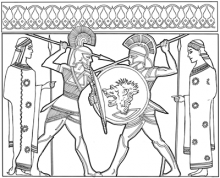
You are here
Episode 5: The Duel
Story summary
Teaching activities
- Starting points
- Follow-up
- Further activities
On the shore the Greeks set up a camp as big as a city, as the Trojans look on. Finally the Greek army comes out of its camp, thousands of men ready for war. The Trojan army comes out of the city and the two armies face each other.
Paris, the cause of the fighting, offers to fight any Greek in hand-to-hand combat. Menelaus himself, the husband of Helen. takes up the challenge. Paris, afraid, is spurred on by his brother, Hector, the leader of the Trojan army. Paris and Menelaus face each other — whoever wins will win the war and keep Helen for himself without the need for further bloodshed. The war may be about to end.
Paris and Menelaus fight. Menelaus gets the upper hand — but Paris magically disappears. He has been rescued by Aphrodite, his protector. Aphrodite spirits Paris back to his bed to recover; Helen attends to him.
On the battlefield, everyone is amazed by Paris’ disappearance. Hector, the leader of the Trojan army, declares that Menelaus has won: Helen will be returned to him and the Greeks will go home. The war is about to end. BUT Athene has not had her revenge on Paris for failing to choose her as the most beautiful goddess — Paris is still alive and Troy is still standing. They must both fall before the war can end. Athene restarts the war by persuading a Trojan archer to shoot an arrow at Menelaus. War breaks out again. Stalemate follows. the Greeks cannot destroy the strong walls and gates of Troy, and the Trojans cannot beat the mighty Greek army with Achilles out on the plain.
Visual aids
Menelaus and Paris
Based on an amphora by the Amasis Painter, c. 540 BC. Private collection.
In response to the challenge laid down by Paris, Menelaus (on the left) meets Paris in a duel. Each fighter is accompanied by an attendant. As is usually the case on Greek vases, the dominant figure occupies the left-hand position in the composition.
